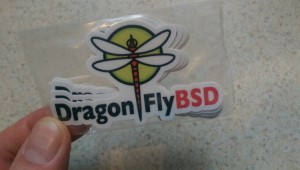Why buy ECC RAM? This is a discussion I’ve seen many times. I’ve always heard that without the error checking, you can’t tell if a random bit was flipped by a cosmic particle. That seems like a very remote threat. Over the last week, I went to Science North in Sudbury, Canada, and saw the Diffusion Cloud Chamber. I took a photo myself. Both of those picture represent an instant in time, and each of those squiggles in the chamber in that instant represents some particle zipping through space that miiiiiight scramble your RAM. That’s… a lot more common than I thought.
There’s been a bugfix-release to the release version of DragonFly, bringing it to 4.2.4. This is to fix a rare crash on issuing ‘shutdown -h now’. If you haven’t had this problem, there’s no rush to upgrade.
If you are sure you don’t need to look at your boot menu for very long in DragonFly, you can make it zip by quickly.
A DragonFly machine with a lot of network traffic will have a significant amount of memory consumed by all the running network connections. (as with any system) It’s now possible to adjust the amount of memory set aside for those operations, live. This sort of fine-tuning will only matter if you run an extremely busy machine, but it’s worth it if you do.
DragonFly ships with wpa_supplicant, for setting up WiFi. However, there’s no guarantee it’s the latest version. A solution exists: security/wpa_supplicant in dports. However, this has a chicken-and-egg problem, where you need wpa_supplicant to get online and download the dports version of wpa_supplicant. So, DragonFly still includes wpa_supplicant in the base system, but you should upgrade to the dports version when possible.
Hey, my stickers arrived! You can order your own.
There was a newer release of OpenSSL (1.0.1p) last week, so there’s a new revision of the DragonFly release – 4.2.3. There’s little major change other than the security fix for OpenSSL.
Those readers who can count past 2 may notice that there wasn’t a 4.2.2. We went straight from 4.2.1 to 4.2.3. That’s my fault. I screwed up tagging and Git doesn’t like repeated, deleted tags.
I don’t know enough about Erlang and LFE to say much other than “Hey, look at this article about installing LFE on DragonFly!” (via)
Something I’ve wanted for a long time: DragonFly stickers. Or ‘decals’, if you want to sound fancier. Markus Pfeiffer has them set up on Stickermule.
I just created an account there, and apparently I can supply a referral link which gets you and me both a $10 credit, if you use that. It’ll make you sign up, then you’ll probably have to go back in with the direct link for the DragonFly sticker.
BSDNow 096 has the usual new links, even more BSDCan 2015 video links, and an interview with Jun Ebihara about some of NetBSD’s lesser-known architectures.
(I like trying to guess the interview subject from each week’s obscure title; I was going to guess RetroBSD… which would make a good topic to explore.)
There’s a minor update for DragonFly 4.2 – this covers a problem with i915 support, so it’s worth upgrading if you have an Intel video chipset.
DragonFly 4.2 is officially released! You can go to the 4.2 release page for details, go to the mirrors page to download, or read my users@ post for upgrade steps.
Update: news stories and commentary seen on lobste.rs, Hacker News, and linux.fr.
If you wanted to try IPFW3 and NAT, nans_nans1 has done the experimentation for you, and wrote down the steps.
I’ve uploaded DragonFly 4.0.6 ISO and .img files. (Does that capitalization make sense?) They should be available at your nearest mirror, or will be shortly. I am still working on the 4.2 release candidate images.
This week’s BSDNow has a talk with DragonFly’s very own Sepherosa Ziehau, about the huge amount of work he’s done on the network stack.
The direct memory access reservation on DragonFly has been set to 128M. It used to be 16, but anyone using a system for more than a text console would want the greater memory reservation. It can be set back to 16M, which is useful probably if you are one of those text console users, or if you have a strangely underpowered video card.
If you are using a DragonFly system with accelerated video, and you have noticed that you can’t return to a text console after exiting xorg – Sascha Wildner/Imre Vadasz have a branch for you to try. Please do so if you have time and are on master; this is the last big item to fix before the next release.
That’s Non Uniform Memory Architecture, and John Baldwin is talking about how it works on FreeBSD, tonight/now, in New York City for NYCBUG. There’s several more events this month with NYCBUG, so look at the announcement for tonight’s location and more dates.
If you were running a version of DragonFly 4.1 (i.e. the master version, not release) built between the 20th and 25th, rebuild. There’s a UFS bug introduced in that short timeframe.
If you are running 4.0.x release or built your version of DragonFly-master outside of that date range – you are unaffected.

